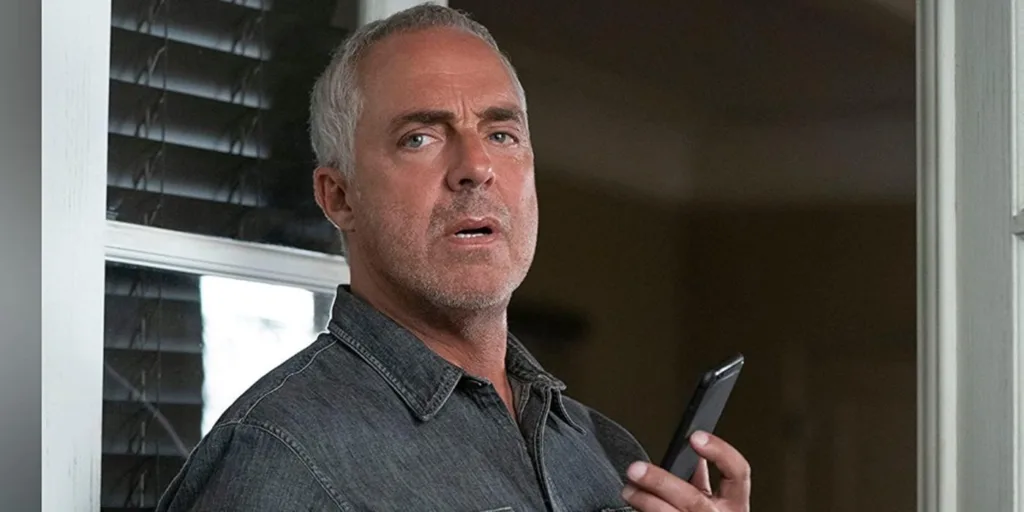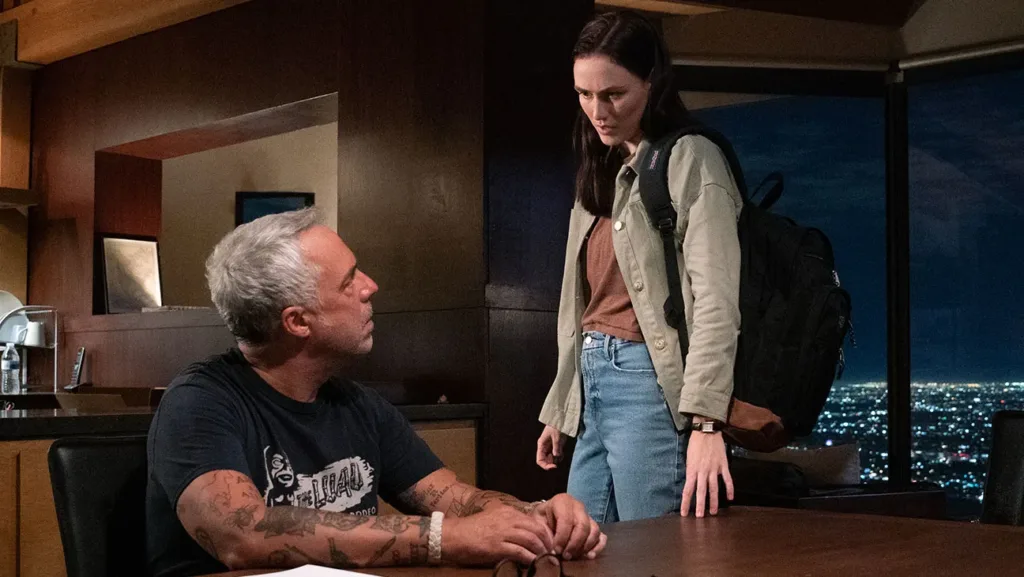Bosch: Legacy draws its narrative from Michael Connelly’s novels, extending a storied tradition that began with the original Bosch series. This new iteration carries forward character arcs that have matured over time, leading us to a Season 3 where long-established histories confront fresh challenges.
The spin-off, having shifted its focus from police procedures to a more personal examination of its characters, positions this season as a decisive chapter in the saga. Set against the backdrop of Los Angeles, the series uses the city’s sunlit facades and shadowed corners to mirror its mix of hard-edged realism and underlying melancholy.
Los Angeles is not merely a location; it reflects the internal conflicts of characters who have spent years on the margins of both law and personal redemption. The final season stitches together past mistakes with current dilemmas, compelling its figures to face unresolved mysteries while contending with new dangers.
Central to the narrative is the conflict stemming from old secrets and emerging threats. The storyline intertwines the evolving relationship between father and daughter with the professional trials of law enforcement and the political arena. In doing so, Season 3 crafts a narrative that is both a reckoning with history and a contest for the future, inviting viewers to examine the weight of legacy in every choice.
Narrative Mechanics and Plot Dynamics
The season centers its tension around the investigation into Kurt Dockweiler’s controversial death. Hints that Harry Bosch might have played a part in the incident add layers of complexity to the investigation, keeping viewers on edge. This inquiry forms a sturdy backbone for the season’s storytelling, as each scene seems to pulse with the weight of unanswered questions. Every piece of evidence uncovered fuels suspicions and drives the characters to confront issues they have long tried to ignore.
Honey Chandler’s campaign for Los Angeles District Attorney is not merely a subplot; it is a critical element that introduces a politically charged atmosphere. Her bid for the office is portrayed with precision, capturing both the ambition and the hurdles she faces.
The narrative skillfully depicts the obstacles within a political contest—rivalries, internal dissent, and personal stakes that complicate her public mission. Chandler’s struggle within this politically fraught arena adds an extra dimension to the unfolding drama, intertwining public aspirations with private battles.
New investigations surface in the form of additional cases, such as the search for a missing family and a series of high-stakes robberies. These investigations inject freshness into the narrative, creating opportunities for short-form storytelling that supports the season’s main arcs. The balance between these case-driven episodes and the overarching narrative ensures that viewers receive both immediate puzzles to solve and long-term questions that evolve gradually.
A significant narrative device is the eight-month time jump that refreshes the pace of the story. This shift allows the show to reposition characters and reframe earlier events, providing a new lens through which the audience can assess ongoing dilemmas. Multiple storylines are intercut with care, a method that sustains suspense while deepening the personal challenges faced by each character.
Character Complexity and Actor Deliveries
Harry Bosch continues to confront inner conflicts that arise from his dual role as a former detective and a private investigator. His character wrestles with a strict personal code that does not always align with formal legal expectations. Over several seasons, we have watched him struggle with memories of past decisions and unspoken regrets. In Season 3, his internal debates are given fresh weight, providing a deeper insight into the decisions he must face in the present.
Maddie Bosch shows noticeable growth from an inexperienced officer into a driven investigator. Her evolving skepticism about her father’s secretive methods injects tension into their exchanges. Her determination to forge an independent path while contending with the shadow of her lineage is portrayed with quiet intensity. The on-screen friction between her reliance on familial ties and her need for professional validation creates moments that are both emotionally charged and thoughtfully written.
Honey Chandler is portrayed as a character caught between ambition and loyalty. Her campaign for the office is depicted with a mix of idealism and practical challenges. Her interactions with colleagues and adversaries reveal a multifaceted personality that grapples with political pressures and personal ethics. The balancing act required to maintain trust with Bosch while pursuing a public career offers a subtle commentary on power dynamics in modern law enforcement narratives.
Supporting roles, including Detective Jimmy Robertson and other figures from Bosch’s past, contribute fresh layers to the unfolding story. These characters challenge Bosch’s methods while providing alternative perspectives on justice.
The performances are marked by a measured intensity and a well-timed sense of humor that lightens heavier scenes without sacrificing seriousness. Veteran actors share the screen with newer talent, their combined presence enriching the evolving narrative in a manner that rewards close attention.
Themes, Tone, and Atmosphere
A persistent theme in this season is the tension between following strict legal procedures and taking matters into one’s own hands. The investigation into Dockweiler’s death prompts characters to weigh the merits of rule-bound justice against the pull of personal retribution. Questions about whether actions stem from a desire for fairness or a search for personal vindication animate the ethical dilemmas at play, mirroring disputes faced in everyday life.

Legacy permeates every decision the characters make. Past actions cast long shadows, with the history of prior cases influencing current behavior. Harry’s decisions are colored by memories of previous errors, forcing him to reckon with the effects of choices made long ago. Maddie, stepping into a role that requires her to challenge inherited assumptions, shows a keen desire to redefine her identity.
Her evolving stance prompts both personal and professional reexamination of values and responsibilities. The mood of the season is defined by a measured seriousness intermingled with moments of introspection. A sense of tension runs throughout, tempered by quiet instances of self-reflection.
Dialogue and pacing work together to capture both the demanding realities of police work and the solitary moments that speak to deeper inner conflicts. Los Angeles is presented as a central element of the narrative. Its sunlit streets and shadowy corners mirror the contrast between overt actions and unspoken emotions, giving the environment a palpable role in shaping the overall mood.
Production Quality and Stylistic Elements
Season 3 employs a visual language that mirrors the internal conflicts of its characters. The camera work shifts seamlessly between intimate close-ups and expansive cityscapes, capturing subtle expressions alongside the sprawling urban backdrop.
Lighting is used sparingly yet effectively, highlighting moments of vulnerability while casting long shadows that reflect the internal struggles of the protagonists. The careful choice of angles and movement not only underscores the tension within each scene but also frames Los Angeles as a living, breathing entity that echoes the series’ thematic concerns.
The screenplay exhibits a clear commitment to character-focused storytelling. Dialogue is sharp and measured, crafted to reveal the inner workings of each individual without ever feeling contrived. Every exchange feels deliberate, designed to peel back layers of hidden motives and unresolved guilt. This approach lends a refined precision to scenes that might otherwise be cluttered with exposition.
Sound and music contribute a subtle yet impactful layer to the narrative. A carefully curated score supports key moments, using understated motifs to amplify the emotional stakes. The sound design punctuates scenes with a deliberate quietness that amplifies the weight of unspoken words and internal monologues, enhancing the atmospheric tension that defines the series.
The use of authentic locations throughout Los Angeles adds a tactile quality to the visual narrative. Detailed set design and recurring motifs—such as specific urban landmarks—serve as visual reminders of the characters’ pasts and the moral questions they face. Each element, from the selection of locations to the meticulous soundscapes, is employed with an exacting precision that reinforces the narrative’s focus on personal reckoning and the consequences of past actions.
Narrative Resolution and Future Prospects
Season 3 brings its varied plot threads to a sharp turning point, with mysteries set up over previous installments finding their way toward closure. The investigation into Dockweiler’s death, political maneuvers in the DA race, and the unfolding personal trials of our central figures converge at moments that provide both satisfaction and food for thought.
Harry’s struggle with his past missteps and Maddie’s growing independence create a dynamic that seems to wrap up years of internal conflict. Meanwhile, Honey’s campaign is depicted with a precision that aligns her professional ambitions with her personal convictions, adding weight to the final episodes.
Some questions remain open, hinting at a world beyond this season. The narrative leaves enough room for further exploration of the characters’ lives, setting the stage for possible extensions of the Bosch universe.
This openness does not dilute the impact of the season’s developments; instead, it suggests an ongoing exploration of personal legacy and ethical dilemmas in a city where every street corner holds a story. The manner in which unresolved elements are threaded through the final scenes invites viewers to consider the lasting impact of the choices made by each character.
The Review
Bosch: Legacy Season 3
Bosch: Legacy Season 3 delivers a satisfying mix of intricate plotting and well-drawn character arcs. The show builds tension through complex narrative threads and strong performances, all set against a richly depicted Los Angeles. Personal conflicts intertwine with professional challenges, creating a series that feels both measured and impactful. The storytelling remains focused and precise, offering fresh twists on familiar themes while preserving a strong sense of its own history.
PROS
- Intricate narrative construction
- Deep character exploration
- Strong performances from the main cast
- Vivid portrayal of Los Angeles
- Thought-provoking ethical dilemmas
CONS
- Some plot threads remain open
- Occasional uneven pacing
- Certain subplots lack full development



















































